Chances are, you haven’t though much about the browser on your Android phone or tablet. The browser that came with it is perfectly fine, right? There are actually some pretty good reasons to consider using a new browser, especially since, unlike iOS, browsers on Android are more than mere “re-skins” that rely on the stock browser engine. Significant new features like floating windows, popular plug-ins, desktop modes, blazing speeds are all on tap, most of these alternatives are free.
AOS– solid, but basic
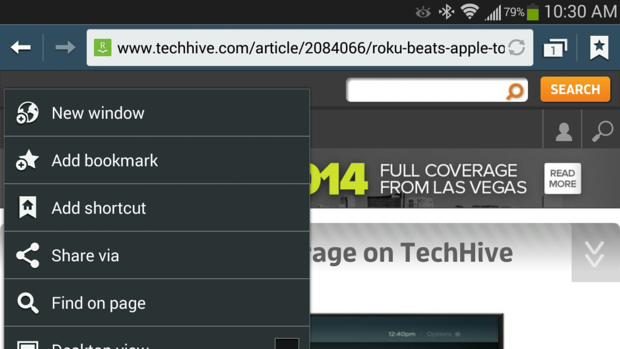
The AOSbrowser defines basic.
The AOS(Android Open Source oject) browser installed by default on many Android devices is swift, simple, serviceable, but there are other options worth exploring if you feel constrained by its paucity of features rudimentary layout. It survives on older phones gets bundled with carrier software preloaded on many Android devices because it’s easy to support rock solid stable. It’s not a bad browser, but it doesn’t scale well with modern, high-resolution smartphones or deming sites.
Consider the AOSbrowser a backup choice, if nothing else. Newer phones tablets don’t come with it installed, it isn’t available for download via the ay store from . You’ll have to hunt down an A, or use one of the installer apps from third parties in the ay store (if you trust them).
Chrome – the company man
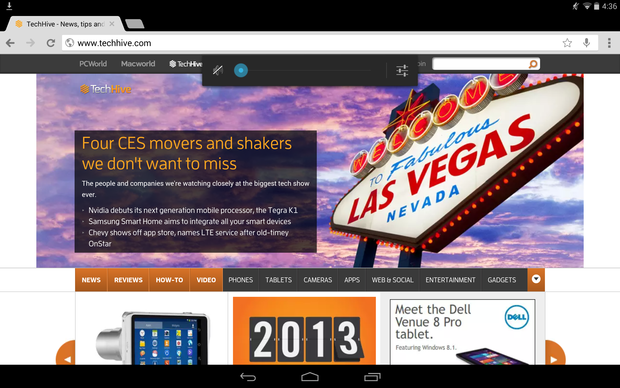
The Chrome experience on Android is very similar to the desktop version.
Recent Android releases come with Chrome installed as the default browser, has worked hard to make it worthy of this privilege. Initial releases were dog slow prone to constant crashing, but a stream of improvements has made Chrome a real contender. ile it still feels slower than the competition, it enjoys newfound stability is highly compatible with web stards (although Flash is no longer officially supported). If you use Chrome on your desktop or laptop, you’ll love the ability to sync bookmarks, push open tabs between platforms, search through your common search history. You’ll want to grab the Chrome to Mobile extension to make the most of it.
Chrome isn’t the default on every phone yet, bloat may be the reason. It’s a huge hungry beast, really only runs great on the highest-end phones tablets. For many older devices, it’s just too much.
Another annoyance with Chrome is ’s insistence on hiding many key settings in obscure system pages like chrome://flags/. Still, since has put the full faith trust of the Android ecosystem behind it, Chrome is the place to start when looking for a new browser.
Daring users can also install Chrome Beta, which lives side-by-side with regular Chrome. New features performance improvements show up there first, but stability isn’t guaranteed.
Boat – whatever floats yours
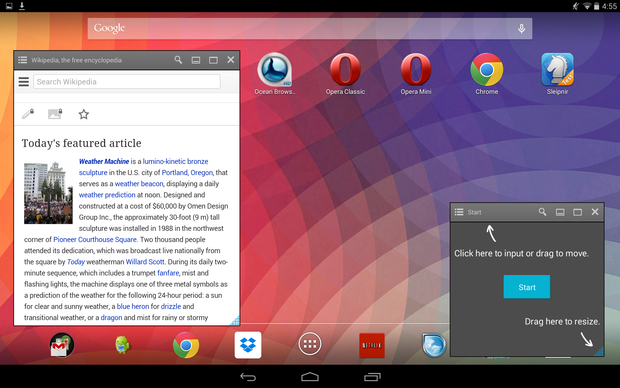
Boat’s floating tabs can come in hy on large tablets.
Boat comes in two versions: the stard phone flavor an HD version designed for high-resolution tablets like the Nexus 10. The palette UI design make for a bl first impression, which is too bad, since Boat is one of the most innovative mobile browsers out there.
The feature list is extensive: synchronized bookmarks (with Firefox on the desktop), Flash support, custom gestures, a built-in file manager. Top of the list, however, are floating tabs. These are resizable browser windows that remain in the foreground of the screen no matter what else is running at the time or which task you switch to. You can even open more than one. Floating tabs support everything from YouTube to email are a godsend when multitasking on a large tablet. Expect this feature to be widespread before long.
Boat has some shortcomings, however. Compatibility is good but speed is mediocre. Boat may feel a little faster than Chrome, but that’s not saying much. Swiping causes complex pages to stutter, fonts sometimes display improperly. Moreover, Boat’s full version isn’t free, although the $3 price is low enough not to quibble. You’ll want to keep this one around for the floating tabs alone, especially if you use a tablet.
Dolphin – Stylish, swipey fun at full speed
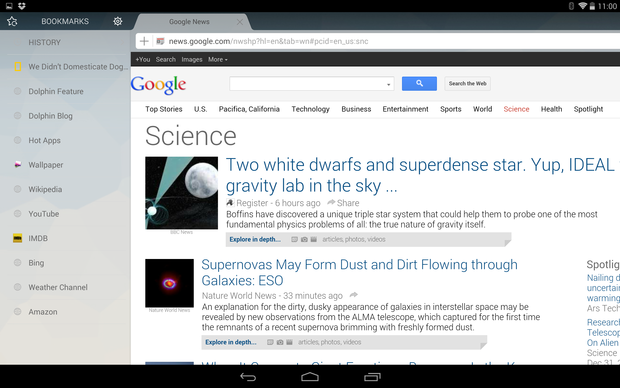
Dolphin’s swipeable side menus are in keeping with modern app interface design.
Dolphin’s stylish radial interface swipeable side menus are only part of its charm. The main reason to love Dolphin is speed. Gliding across challenging mobile sites like News produces smooth, glassy horizontal movement, limited more by download speeds than tablet horsepower. It’s a tactile pleasure. ge rendering is crisp accurate; there’s a lot here to like.
ile it’s no challenge to Firefox’s extensive add-on library, Dolphin sports a few plug-ins such as an ad blocker Flash player, which help to round out the feature list a bit.
If you’re using an older device, Dolphin’s low memory footprint excellent speed make it a natural choice. It does crash a lot, however, so be prepared for a healthy share of unceremonious exits to your home screen.
Maxthon – Nothing a lick of paint can’t fix
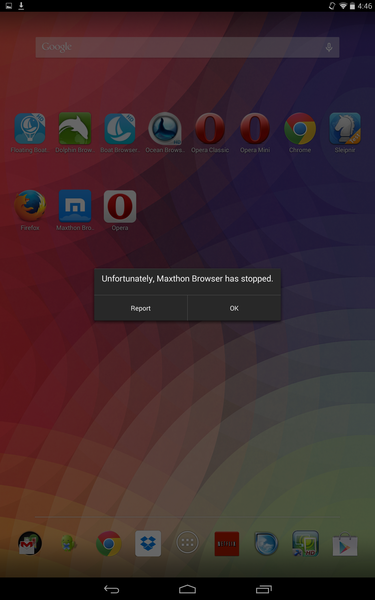
Maxthon is a little rough around the edges.
Maxthon is a curious specimen. It promises Dolphin-like speed along with a grab bag of hy browser tricks, but rough edges poorly implemented ideas rob its potential. For example, an extensive cloud synchronization process has been implemented, but it requires you to install use an obscure Maxthon browser on your desktop/laptop to be of any real value.
Another example is a hy quick-access menu where you opt to have the browser pretend to be a different kind of browser, so you get a specific optimized web layout. You can tell it to look like a desktop, Android, id, or ione browser, but Maxthon will often render pages with clipped fonts, obscured column edges, other visual anomalies when fonts are set beyond default size. Often, you’ll find yourself staring at a grey apology; “Unfortunately, Maxthon has stopped.”
Under most circumstances Maxthon does fine for itself. The layout is clean attractive, page loads are reasonably swift. It’s a nice step up in features from AOS but there are others browsers here more worthy of your attention.
Firefox – A love letter for desktop Firefox fans
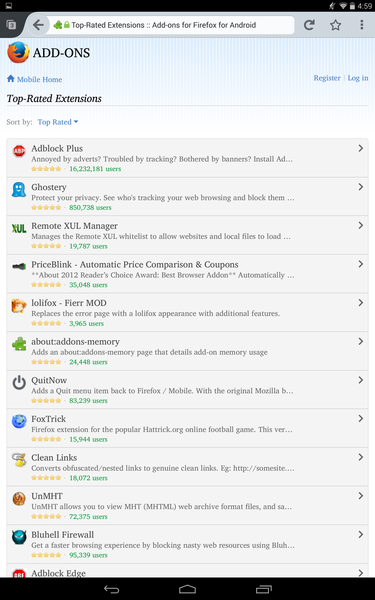
If you like Firefox on the desktop, with its huge library of plugins, you’ll love Firefox on Android.
If plugins are your thing then look no further. Faster more feature-rich than Chrome, Firefox echoes the strengths of its desktop counterpart at the cost of an admittedly noticeable deficit in stability. Firefox also looks great, with design cues that are an attractive departure from the more conservatively styled browsers in this group.
Favorite add-ins like stss, NoScript, AdBlocker have made the trip to Android along with Firefox, which will make the glitches worth enduring for many. The legion of desktop Firefox users will also find passwords, bookmarks, tabs, history synchronized for easy crossover between devices. Hy, since Firefox is everywhere.
ong with the crashes, Firefox could st to lose a few pounds. It’s second only to Chrome in memory usage. It also has a few problems rendering tablet-friendly sites like News, defaulting to desktop layouts.
Opera Mobile – lished perfection, sans innovation
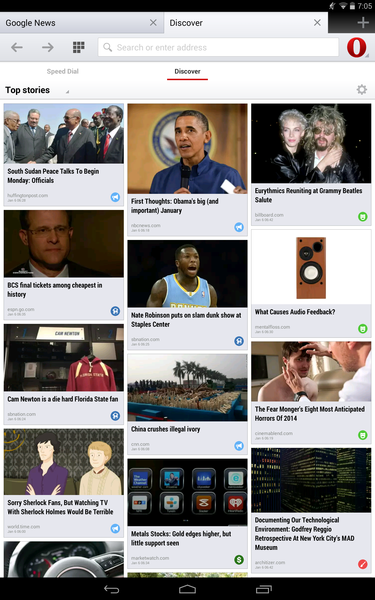
Opera’s Discover page aggregates stories for you.
Opera is the grdaddy of this group, first released way back in 1994 on ndows s, but don’t let the grey hair fool you. It’s one of the best browsers here, recently the recipient of a comprehensive rewrite. th speed stability to spare, Opera serves up basic browsing features with a degree of élan polish most of the others can’t match. Site compatibility is top notch.
Unique features are few but helpful, such as the Discover page, a Buzzfeed-like story aggregator built into the browser that’s reasonably adept at finding media items of interest. Another hy setting is Off-Road mode, which compresses content for reduced bwidth situations. Don’t expect anything too wild in terms of novel ideas, however. Opera’s main flaw is playing it safe when it comes to trying new things.
Opera Software ASA also produces Mini Classic versions, designed for lower clock speeds or pre-ICS versions of Android.
















